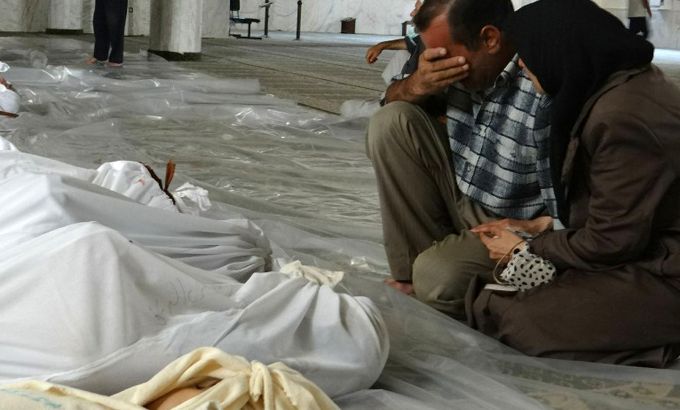Obama mulls Syria options after ‘gas attack’
Advisers present US president with a “range of options” for responding to alleged chemical weapons use in Syria.

Barack Obama received a “detailed review of a range of potential options” from his top advisers on how the United States and its allies could respond to an alleged chemical weapons attack in Syria, the White House said.
The US president also spoke with David Cameron, the British prime minister, about Syria by telephone on Saturday and agreed to consult about “potential responses by the international community,” the White House statement said.
The statement did not provide details about what options were under consideration, and gave no indication about Obama’s timeline for making a decision on the issue.
Chuck Hagel, the US defence secretary, on Sunday said the Pentagon was prepared to carry out military options on Syria should Obama choose to exercise any of them.
“President Obama has asked the Defence Department to prepare options for all contingencies. We have done that and we are prepared to exercise whatever option – if he decides to employ one of those options,” Hagel told reporters during a trip to Malaysia.
A White House official said that Obama had asked for evidence to be gathered on the attack in a Damascus suburb on Wednesday, which opposition groups say killed as many as 1,300 people.
“In coordination with international partners and mindful of the dozens of contemporaneous witness accounts and record of the symptoms of those killed, the US intelligence community continues to gather facts to ascertain what occurred,” the official said.
US Secretary of State John Kerry spoke to Walid al-Muallem, the Syrian foreign minister, on Thursday and told him the Damascus government should have let UN inspectors have access to the site of the alleged gas attack, the State Department said on Saturday.
Kerry called “to make clear that if, as they claimed, the Syrian regime has nothing to hide, it should have allowed immediate and unimpeded access to the site rather than continuing to attack the affected area to block access and destroy evidence,” a State Department official said.
Kerry, who participated remotely in the White House meeting on a potential US response to the alleged use of chemical weapons in Syria, made a round of diplomatic calls on Saturday to his counterparts in Saudi Arabia, Jordan and Turkey, the official said.
“In all these calls, the secretary emphasised the importance of quickly determining the facts and underscored the seriousness and gravity of any chemical weapons use,” the official said.
‘Serious response’
A spokesperson of Cameron said that the British prime minister and Obama agreed that a significant use of chemical weapons in Syria would merit a “serious response” from the international community.
“They are both gravely concerned by the attack that took place in Damascus on Wednesday and the increasing signs that this was a significant chemical weapons attack carried out by the Syrian regime against its own people,” the spokesperson said.
Cameron also spoke to Stephen Harper, the Canadian prime minister, about the situation in Syria and the need for an appropriate response, the spokesperson said.
The US president has repeatedly warned that Syrian President Bashar al-Assad would cross a “red line” if his forces used chemical weapons, and compel the US to action.
If confirmed, the attack would be the deadliest use of chemical agents since Saddam Hussein gassed Iranian troops, and Kurdish rebel areas in northern Iraq in the 1980s.
The Syrian government has denied using chemical weapons, and blames rebels for the attack.
On Friday, Hagel suggested that the US was moving forces into place ahead of possible military action against Syria.
However, Obama has expressed caution about the kind of intervention that could draw the US into another prolonged conflict in the Middle East.
Naval presence
US commanders have nevertheless prepared a number of options for Obama if he chose to proceed with military strikes against Damascus, Hagel said.
Reuters news agency reported that the commander of the US Sixth Fleet had decided to keep the USS Mahan, a warship armed with cruise missiles, in the region despite the ship having completed its deployement.
The USS Ramage, a guided-missile destroyer that was orginally intended to replace USS Mahan, has also arrived in the region.
Travelling in Malaysia, Hagel discussed in his statement, the decision to keep the Mahan in the Mediterranean.
“The Defence Department has responsibility to provide the president with options for all contingencies,” he said. “And that requires positioning our forces… to be able to carry out different options – whatever options the president might choose.”
Asked whether it was fair to report that the US had moved assets, Hagel said: “I don’t think I said that. I said that we are always having to prepare – as we give the president options – prepare our assets and where they are and the capability of those assets to carry out the contingencies we give the president.”